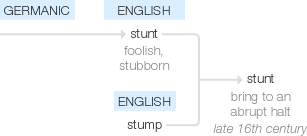Stunt
late 16th century (in the sense ‘bring to an abrupt halt’): from dialect stunt ‘foolish, stubborn’, of Germanic origin; perhaps related to stump.
wiktionary
Unknown. Compare Middle Low German stunt(“a shoulder grip with which you throw someone on their back”), Middle English stunt(“foolish; stupid”).
From dialectal stunt(“stubborn, dwarfed”), from Middle English stont, stunt(“short, brief”), from Old English stunt(“stupid, foolish, simple”), from Proto-Germanic *stuntaz(“short, compact, stupid, dull”). Cognate with Middle High German stunz(“short”), Old Norse stuttr(“short in stature, dwarfed”). Related to Old English styntan(“to make dull, stupefy, become dull, repress”). More at stint.
etymonline
stunt (v.)
"check in growth, dwarf," 1650s, earlier "bring to an abrupt halt" (c. 1600); "provoke, anger, irritate" (1580s), from obsolete Middle English adjective stunt "foolish, stupid; obstinate," from Old English stunt "stupid, foolish" (as in stuntspræc "foolish talk"), from Proto-Germanic *stuntaz "short, truncated" (source also of Middle High German stunz "short, blunt, stumpy," Old Norse stuttr (*stuntr) "scanty, short"), an adjective which stands in gradational relationship to stint (v.).
The modern sense of the English word is from influence of the Old Norse word. The Middle English adjective is attested from mid-15c. in the sense "of short duration." Related: Stunted; stunting.
stunt (n.)
"feat to attract attention," 1878, American English college sports slang, of uncertain origin. Speculated to be a variant of colloquial stump "dare, challenge" (1871), or of German stunde, literally "hour." The movie stunt man is attested from 1930.
